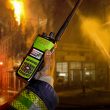NENA’s Fontes has a universally good idea
On Tuesday, we shipped off to the printer a new supplement called PSAP, which will be published with our August edition. In it is an interview with Brian Fontes, the new CEO of the National Emergency Number Association. Fontes told senior writer Donny Jackson that creating a universal service fund could solve the funding woes that long have plagued the public-safety-answering-point (PSAP) sector. It’s a great idea, and long overdue.
In 1996, Congress passed the Telecommunications Act—an update to the Communications Act of 1934, which created the FCC—which established the Universal Service Fund, to which all interstate telecommunications providers must contribute. The idea behind the fund was to create a subsidy mechanism to ensure that citizens who lived in rural, low-income or high-cost areas would have access to telecom services that were comparable to those enjoyed by urban dwellers—who benefit greatly from economies of scale—at comparable prices.
There is little question that affordable, advanced telecommunications services enrich lives. That said, a well-functioning 911 system saves them. Clearly, a dichotomy exists today between the 911 service enjoyed by residents of densely populated areas and that available to those in sparsely populated areas. Indeed, of the counties nationwide that still do not have Phase II wireless enhanced-911 service, the vast majority of them are rural.
And the money doesn’t exist to upgrade them, either to Phase II or, better yet, to the next-generation technologies we’ve been hearing about. Four years ago, Congress authorized $1.25 billion over a five-year period for Phase II upgrades, but only $43 million has been appropriated so far. NENA officials believe that recent legislation that allows funding from the ENHANCE 911 Act of 2004 to be used for purposes other than Phase II—something some on Capitol Hill believe will be better politically, given the advent of next-gen 911 and the fact that the most populous areas already have made the Phase II upgrade—will help the money to flow, and they’re probably right.
But $1.25 billion isn’t going to be enough to bring next-gen 911 services to every American, regardless of where they live. To get the job done, Congress is going to have to step up and make a bigger commitment to this. Yes, I know this is a tough economic climate, the federal budget is under extreme pressure, and taxpayers will be in no mood to hear about USF fees, even if they only amount to pennies per month.
But Congress always seems able to find taxpayer money for pet projects, regardless of the economic climate. It needs to make NG 911 a priority. And Fontes should make a USF model for the PSAP sector his priority. He’s onto something.
Better still, let’s create a public-safety USF fund that also could be used to fund the proposed nationwide wireless broadband network in the 700 MHz band. We live in a world that grows more dangerous by the day. We, and the first responders who serve and protect us, need—and deserve—the very best emergency communications.
E-mail me at [email protected]

















